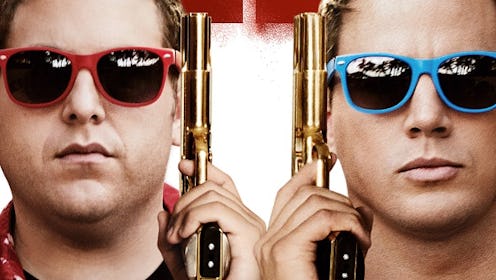Entertainment
'22 Jump Street's Big Gay Problem

People flocked to the theater in droves to see buddy comedy 22 Jump Street this past weekend, and with good reason — at times, it’s a very funny movie. The follow-up to 2011’s 21 Jump Street, which was loosely based on the popular '80s television crime drama of the same name, debuted at number one at the box office, earning an impressive $60 million. Considering the movie cost less than $60 million to make, that’s a major triumph.
The film once again stars Jonah Hill and Channing Tatum as incompetent cop partners Schmidt and Jenko, only this time around, instead of going undercover to take down a high school drug ring, the two go undercover to take down… a college drug ring. Hilarity ensues. Well, sometimes. The movie has a really problematic running gag regarding the nature of Schmidt and Jenko’s relationship that, unfortunately, kind of left a bad taste in my mouth.
Throughout the movie, there are a lot of amusing jokes that poke fun at the common features of a franchise sequel: a rehashed plot, an increased budget that leads to over-the-top action sequences for no reason, etc. There are also some pretty hysterical one-liners (mostly delivered by Workaholics’ Jillian Bell) about Schmidt’s age and appearance. The fact of the matter is, both Hill and Tatum are way too old to be playing characters who are trying to pass for college students, and 22 Jump Street wants audiences to know that it’s in on the joke.
But when Schmidt and Jenko’s bond is tested as they begin to grow apart in "college" (Schmidt befriends the campus’s art crowd, while Jenko joins a fraternity and starts playing on the football team), a rather juvenile, overplayed kind of humor rears its ugly head: “OMG, wouldn’t it be so funny if these guys were, like, gay??”
During a climactic argument in the middle of the film, Jenko tells Schmidt that it might be time for them to “investigate different people.” Schmidt is crushed, and the rest of their interaction closely resembles a romantic breakup. But of course, these two guys were never really interested in each other like that. That would just be silly! Hill and Tatum are essentially “playing gay” for laughs. It’s a familiar gag that isn’t really funny at all, but that doesn't stop the writers from trotting it out again and again as the movie progresses.
Later, Schmidt and Jenko accidentally end up at a therapy session with the school’s psychologist, who misinterprets their use of the word “partners” to mean “romantic partners.” At one point, the psychologist asks Jenko if he’s embarrassed of Schmidt, and then insists that the two hold hands in order to strengthen their relationship. Naturally, Jenko is repulsed by the idea, because, why on Earth would he want to hold hands with another man?? Again, the only “joke” here is: “Two men…together? Like that? Ew, gross!”
That’s not funny — that’s lazy, dated, and offensive.
Schmidt and Jenko do end up going their separate ways for a time, but reunite toward the end of the film during spring break in “Puerto Mexico.” While preparing to take down the drug ring together, Jenko warns Schmidt, “You know this is just a one-time thing, right?” Schmidt nods, and then tells Jenko that he missed a spot while applying sunscreen, and begins to slowly rub some lotion on the back of his neck. Get it? They’re acting like gay men but they’re not actually gay men because that would be preposterous and also disgusting! I think I've made my point.
22 Jump Street would've been a much stronger film without these tired jokes — and not just because it would've been less offensive. The fact of the matter is, Schmidt and Jenko’s “breakup," for instance, would’ve been much more effective if it wasn’t written for laughs at all. Instead, the scene could have been used to actually make the audience feel something for the two main characters — two close friends who are in danger of losing each other. Even raucous comedies need a few genuine emotional moments here and there — they provide a much needed contrast to all of the ridiculous hijinks. If done well, these moments can be extremely powerful (just look at a movie like Bridesmaids, for example).
I don’t think that 22 Jump Street as a whole is homophobic — I just think that the decision to include the aforementioned scenes was misguided. After all, there’s a part in the movie where Jenko confronts a criminal for casually using the word “faggot.” Clearly, the writers were aware of the need to be sensitive and inclusive on some level, even though they still ended up largely missing the mark.
At times, 22 Jump Street is a really funny movie, but it’s 2014 and our summer box office blockbusters are still using "gay" as a punch line. That's not okay. Something has to change.
Images: MGM